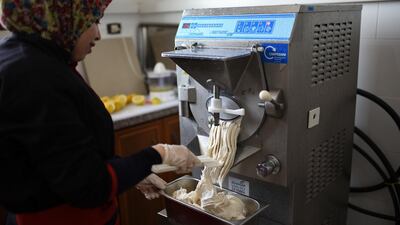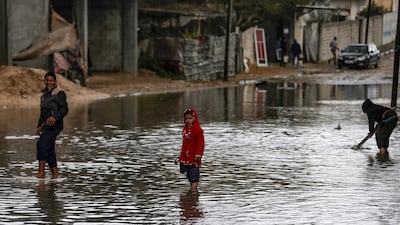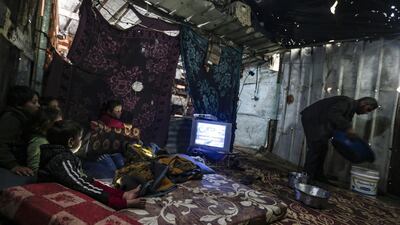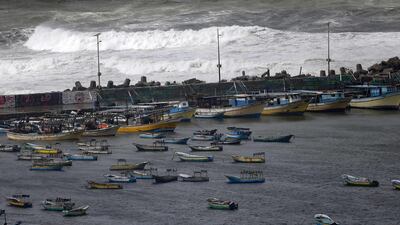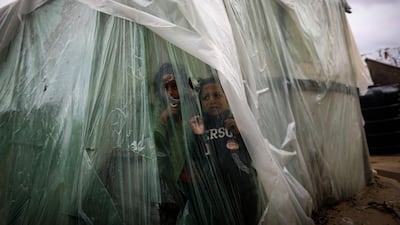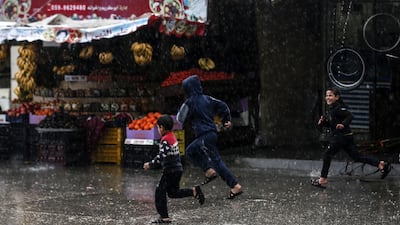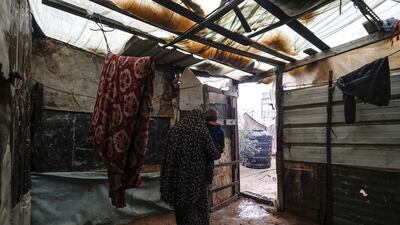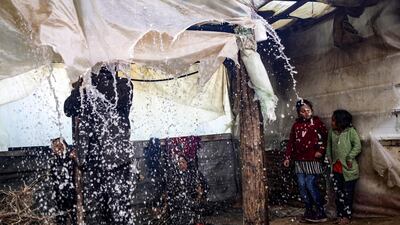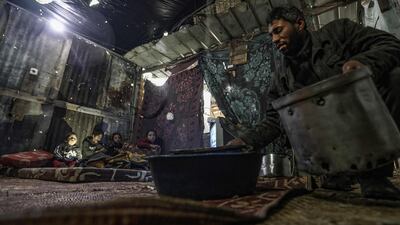Noora Abu Jomiza piles fresh gelato into a container and smooths the sweet banana mixture, ready to be delivered to a new Gaza City shop where Palestinians are scooping up Italian culture.
“I’m very proud of this job, it’s the first time I’m making ice cream and everyone is pleased for me,” says Ms Abu Jomiza.
The 32-year-old was teaching women how to make sweets and other foods when she was hired by the Gelato di Gaza venture, a start-up launched last year.
While the new outlet stands on a busy Gaza City street, the production room lies in an eclectic building in the enclave’s central Bureij refugee camp. Children’s chatter can be heard from the ground-floor kindergarten, while embroidered maps of Palestine hang on the wall of a workshop and the top floor hosts wedding parties.
Dressed in matching black uniforms with red aprons, Ms Abu Jomiza and her colleague Mohammed Wishah are busy preparing the latest gelato batch. They blend fruit with milk before pouring it into a metallic machine, which disgorges the frozen dessert just 10 minutes later.
The team’s training was a key part of the project led by Italian NGO Vento di Terra, which says the scheme offers traditional gelato while at the same time reaching out to marginalised communities.
Gaza’s two million residents are in dire economic straits more than a decade after Israel imposed a blockade on the Hamas-run enclave. Rising unemployment reached 46.7 per cent in the second quarter of 2019, according to the latest figures from the Israeli human rights organisation Gisha.
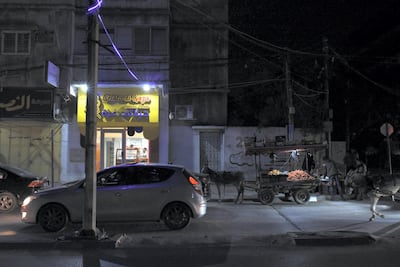
Hiring seven Palestinians to run Gelato di Gaza will not fix the job crisis, but manager Mohammed El Shitali says they are supporting the broader community in other ways.
“We receive our fruit from Gaza, then we use it to produce fresh gelato, so we sell it to the people. It’s a good cycle,” says the 45-year-old.
More than 20 farmers provide the fruit and milk needed for the gelateria, a partnership which Mr El Shitali says is organised through the Italian Agency for Development Co-operation (AICS).
While strawberry season is in full swing in Gaza, the supplies for Mr El Shitali’s other favourite flavour – banana – are brought in from Jericho in the West Bank.
Imports are controlled by Cogat, the Israeli liaison agency to the Palestinian territories, but a spokesperson was not immediately available to detail the process for bringing in West Bank fruit.
The gelato machines were donated by top Italian firm Carpigiani and also crossed the tightly-controlled border, a process made easier by having a representative on the ground, according to the company.
“Obviously there are necessary formalities to respect, but we didn’t notice setbacks or particular difficulties,” says spokeswoman Michela Iorio.
Carpigiani has already been involved in establishing similar gelaterias internationally, including in Cairo and Amman, and says the start-ups are not expected to rely on donor funds in the long-term.
“This project is based on the study of a solid business plan that has the aim of creating an entrepreneurial enterprise that lasts,” says Ms Iorio. “We put a lot of importance on the training and the empowerment of people involved in the projects.”
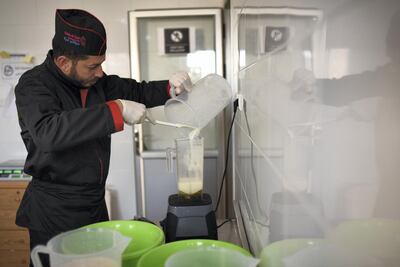
There are no customers at Gelato di Gaza during The National's visit on a cool February evening, but the shop's manager says the team has been busy with a marketing strategy since opening in October.
They have already taken their ice cream van to a local university, serving up hundreds of free samples to students, and are due to do a tasting with a Palestinian communications firm.
“We are waiting for the summer, to decide whether we are good in business or not!” says Mr Shitali of the gelateria, which lies less than a kilometre from the seafront.
Even with a marketing strategy businesses in Gaza face vast challenges, with the World Bank noting the enclave’s economy has been “kept afloat” by aid and remittances.
“The economic and social situation in Gaza ... has been declining for over a decade,” the World Bank said in a September 2018 report. “The situation has reached a critical point with increased frustration, feeding into downward cycle.”
Poverty has hit 53 per cent, an insurmountable figure which staff at Gelato di Gaza are nonetheless trying to tackle.
A pinboard next to the shop’s till is littered with receipts and pictures of ice cream cones, coloured in with pencil. Each one comes from a customer who has bought their own gelato, and then paid to treat someone else who cannot afford their own.
The practice is well-known in Italy as “caffe sospeso” (“suspended coffee”), whereby anyone can walk into a cafe and ask if someone has paid for a stranger to have a coffee.
“There is another culture coming to the people, that you can donate for others,” says Mr Shitali, adding that the idea has proved popular. “It makes people feel better.”
